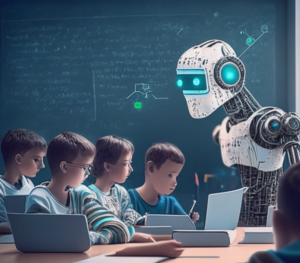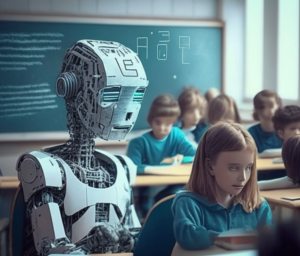Artificial Intelligence
AI (Artificial Intelligence) is a technical science where computers and machines are given the ability to perform tasks related to the intelligence and thinking ability of humans. With the help of Artificial Intelligence, machines gain the ability to learn and solve problems on their own from the latest technical and computational knowledge.
Artificial intelligence is defined as “the branch of science that enables machines to act in the manner of human intelligence”. It is the technology of making machines self-doing and independent so that they can learn on their own, acquire new knowledge, solve problems, and take determined actions .There are so many AI tool like google, youtube, amazon, Netflix, ChatGPT, AI art, Alexa and others make human life easier, faster and more effective. AI is useful in all fields of human life such as science, engineering, health care, commerce, education and so on. Artificial Intelligence and Education will be a great combination to enhance the quality education and making classrooms more advanced and interesting for students.
Artificial Intelligence and Education
Education plays an important role to construct and develop the society. With the changes of time and society the system of education should be updated. In this 21st century Artificial Intelligence make large difference in almost fields of society including education. Education system can be benefited by AI in different perspective.
Benefits of Artificial Intelligence in Education
24*7 Access to learning
With AI-driven digital learning, students get the convenience of learning anywhere, anytime. Each student can set his/her own plan, not limited with particular location. Everyone can tailor their learning to their most productive times, making their learning easy and effective.
Better Engagement
Learning becomes more active and engaging with personalized learning, specialized tasks, and digital visualizations. The personalized learning and immersive experience with AI-driven programs makes students feel more confident and intelligent as they can explore things beyond their syllabus without any hesitation or fear. All these things and new AI techniques are increasing the interest of students in studies.
Creates Low Pressure
With AI-driven programs and personalized learning, students feel less pressured to study. AI-enabled virtual assistants assist students when they ask questions, with complete explanations. In traditional learning methods, students need to ask questions and some students hesitate to ask in front of everyone, and these problems can be solved with the help of virtual assistants. However, not all questions can be answered correctly by these virtual assistants. But for basic questions, they can be of great help which can boost the confidence of every student and reduce the pressure.
Individualized Teaching
AI can provide personalized advice and structure to students by understanding their individual abilities, interests and needs. This makes the study of the students more effective and comfortable.
Student Support
Through the AI system, students are helped to explore the learning material on their own, find answers to questions and understand each and every aspect of the subject.
Observation and Evaluation
AI can facilitate observation and evaluation of students. It helps them to identify their mistakes and weaknesses and can provide them directions to improve.
Negative Consequences of Artificial Intelligence on Education:
Dependence on technology
Human interaction and critical thinking skills may decrease due to increased reliance of AI in education. Students may become overly dependent on AI tools and lose the ability to think independently and creatively.
Equity and Access
AI-powered education resources and tools can lead to a digital divide, where students with limited access to technology or internet connectivity may be at a disadvantage. This can widen the educational gap between economically privileged and socially marginalized communities.
Data privacy and security
The use of AI in education leads to the collection and analysis of a large amount of data on students. This can put the sensitive information of the students at risk and be affected by its improper use.
Bias and Discrimination
Artificial Intelligence algorithms may inadvertently increase bias and discrimination in the education system. If biases occur in the data used to train an AI system, it can lead to unfair treatment, unequal opportunities, and exacerbate existing social biases to equalize.
Loss of human connection
Artificial Intelligence driven learning can be a disadvantage as it can reduce human-to-human interaction, which plays a vital role in the learning process. The absence of face-to-face interaction with teachers and peers can stunt social and emotional development, affecting the overall learning experience of students.
It is important that we acknowledge these potential negative consequences and follow appropriate safety and ethical guidelines in order to use AI in education responsibly and in a way that benefits all students.
For more such Blogs Follow: daytodayfacts.com
To known more on Artificial Intelligence and Education:https://www.unesco.org/en/digital-education/artificial-intelligence


